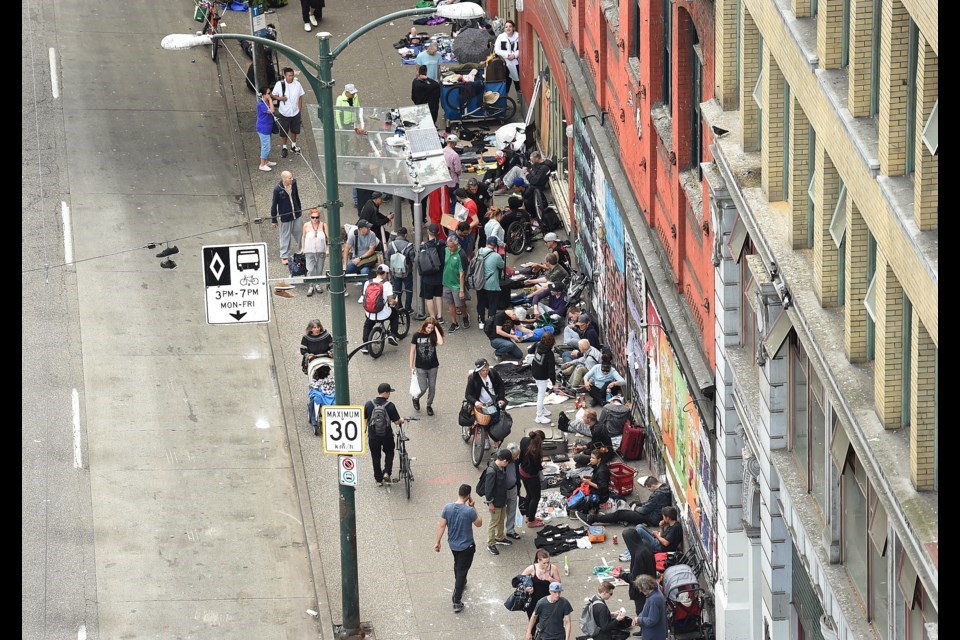The region’s health agency is requesting 32 full-time staff including nurses and social workers be hired to create a non-police “de-escalation program” in Â鶹´«Ã½Ó³»that would be responsible for helping people whose mental health is deteriorating.
The request from Â鶹´«Ã½Ó³»Coastal Health forms part of a wider proposal to address mental health issues announced by Mayor Ken Sim at a Feb. 5 news conference. Details on the program and number of staff were released Wednesday that goes before council Feb. 14.
The report recommends $2.8 million be spent this year to begin hiring up to 58 mental health workers to expand and create services such as the de-escalation program to address Vancouver’s mental health crisis.
Roughly $2.4 million of the budget would be spent on staff hired this year, with the remaining dollars dedicated to evaluating the services, other non-labour costs and $66,000 for “engagement and honorariums.”
The budget would increase to roughly $8 million per year in 2024 and subsequent years.
Program doesn't include police
The de-escalation program would not include police but be comprised of nurses, social workers, cultural support workers, peers and community liaison workers, with support from a psychiatrist, according to the health agency’s proposal.
The program’s staff would work in partnership with shelter and housing operators, park rangers, store owners and service providers “to engage the individual needing support with a trauma-informed and relationship-based approach,” the agency said.
That could mean connecting a person to a mental health team, case management or a program “to engage the individual in meaningful activities such as recreation or work in a peer position.”
Assisting a person find appropriate housing and engaging with people using stimulants or substances — and connecting them with “risk mitigation strategies” — are other components of the job.
The report doesn’t specifically say how much the de-escalation program would cost but does provide salaries of the various positions required to staff the team. The report isn’t clear, however, on whether the salaries are based on experienced workers, rookies, or both.
The positions include a registered nurse ($96,156), psychiatric nurse ($96,156), social worker ($93,508), peer support assistant ($51,432), nurse practitioner ($157,430), community liaison worker ($57,859) and clinical educator ($106,745).
VPD's Car 87/88 service
The balance of the 58 mental health workers would help bolster police-led crisis intervention teams such as the Â鶹´«Ã½Ó³»Police Department’s Car 87/88 programs, which pair plainclothes officers with psychiatric nurses to respond to citizens experiencing mental health issues.
At least 12 workers would be hired to “strengthen Indigenous approaches” across all of the health agency’s urgent mental health services and “develop a comprehensive and seamless referral network to culturally-specific programs and services.”
The mayor was joined at Sunday’s news conference by Dr. Patricia Daly of Â鶹´«Ã½Ó³»Coastal Health, Police Chief Adam Palmer and Premier David Eby, who all expressed their support for the hiring of 58 mental health workers.
The initiative is one promised by Sim’s ABC Â鶹´«Ã½Ó³»party during last year’s election campaign, although the promise was for 100 mental health nurses. Sim and his colleagues have also unlocked funds to have the VPD begin hiring up to 100 police officers.
The proposal requires a two-thirds majority vote of council, which Sim and his party have with eight of the 11 votes at city hall. The requested $2.8 million is in the form of grant and would have to be voted on every year.
“Our council understands the importance of these issues and is committed to the long-term implementation of this program,” Sim said at Sunday’s news conference.
“This investment, along with the funding allocation from council to hire 100 additional police officers will serve to bolster Vancouver's frontline mental health and public safety response.”





